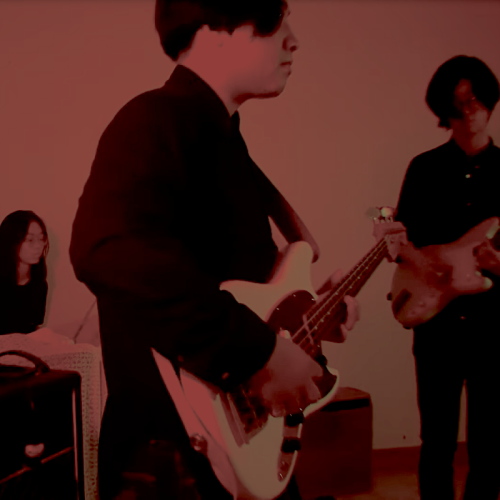If you were to head on down to one of Shanghai’s oldest underground indie venues, YUYINTANG, in the small, cramped space of sweaty weekend-goers, you might feel the reverberation of the hottest new band bouncing off the walls and into your head.
Kenja Time (空加太) is one such band.
Taking off in the Beijing underground in 2019, their debut album “Impossible at Night” was their first foray into streaming. Now, they seek to establish themselves with their sophomore album, An Invalid Witness (无效目击), and its opener, “Dust” (沙尘).
Dedicated to the concept of perceived versus actual truth, the album “Invalid Witness” takes inspiration from UFO-sightings and the controversy that surrounds such testimonies. The album’s bandcamp caption poses such questions: “If you saw an alien with your own eyes, how would you prove it? For the person concerned, is the witnessing experience itself more important, or is the account of the witnessing more important?”
The band goes on to suggest that while some are praised for lying, some are institutionalized for telling the truth; thus, “invalid stories are not fake stories.” Essentially, the way you perceive something has just as much (if not more) bearing on your reality than the reality itself.
True to form, the album covers many “invalid stories”, such as the testimony of tsunami stones in Japan in “Wave”, the perception of labor value in “The Joke”, intellectual extremism in “FenZi”, and several political and “virus”-based songs invoking the paranoia and conspiracies surrounding the pandemic.
A snapshot of Kenja Time:
A three-man band made up of Hu Weihang (“Kangaroo”), Geng Xinhao, and Hu Wanheng (“Vivian”), their sound tends frenetic with lead singer and lyricist Kangaroo’s math-rock level weaving, and engineer-by-day/rocker-by-night Geng Xinhao’s battling bass. Intermittently, Kangaroo turns to the mic to play the crowd, while Drummer Vivian – a medical student – keeps the ship sailing with heavy framing beats, headbanging in the back. At the end of the song, she pulls her curtain of hair behind her ears, as if waking up to the crowd in front of them.
The single itself is a good introduction to both the album and Kenja Time’s ethos; each song is marked by an existential crisis of sorts. “Dust” is a story of a kingdom’s fruitless facade of political gambits and revolutions that inevitably fades into a world of dust.
They decided to crawl under the palace
Pretending to be a member of the city
Their hearts became vicious
For the lost soil
Kangaroo’s vocals are energetic, bizarre – at times, droning. The tonal shifts that often make Chinese lyricism doubly complex is complemented by his staccato flips, each syllable often cut short to make for a quick, breathless run of lyrics – intermixed with shouts and various hypeman war cries, of course.
Rather than have the cohesive texture of mainstream rock, the vocals have the unique, unapologetic flavor of a Rock Lobster, with the cooler, slower groove of a Qomolangma Tomato. It’s also easy to pick up their inspiration from Joy Division in its post-punk sound.
Vivian describes their sound like a “monkey in a cage”, while Kangaroo thinks of it like a spider with “lots of legs and weaving twisted webs.”
He said he saw silver fields
But what was left to him
What was left to him was
Sand and dust…
Rather than fade out with its somber words, the song ends with an abrupt final beat before tripping into the next song – both on streaming and in live sets. It delivers its spin of the world falling to dust with little aplomb, letting the meaning be yours to grab, rather than given. In fact, the lyrics feel more like conceptual staging grounds for the music itself, a space of exhalation rather than inspiration.
The artwork of the album portrays the three band members small and monochrome, looking up at a statue cast in the spotlight of a UFO. Whether you believe in their lyrics (or even their sound) Kenja Time is firm in its sonic convictions, giving validity to its sighting. I may never be cool enough to graze the fields of YUYINTANG or “get” every existential theory, but that doesn’t make their alien sound any less of a spectacle.
That’s the freedom of punk, noise rock, the mindless haze of bass and drums: it insists to stop worrying about what you know, and be present in where you are. So listen and lose your worries for a moment. Ultimately, it’s all noise. And then it’s dust.







